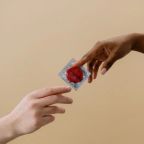STIs and HIV
At Essex Sexual Health Service, we understand the thought of sexually transmitted infections (STIs) can seem daunting or scary.
STIs are common and can affect anyone – however they are becoming increasingly easy to treat, with many of the most common being curable.
Here you’ll be able to find more information on some of the most common, their symptoms, how to get tested and what treatment is available.
None of the information on this page is here to scare or stop you from having sex, it’s simply to encourage a healthy sexual lifestyle.
Chlamydia
Chlamydia is a bacterial infection and one of the most common STIs in the UK – particularly amongst teenagers and young adults.
Things to know:
- Sometimes you can have chlamydia without showing any symptoms
- For some people (not all) it can cause pain, discharge and potentially lead to complications
- Chlamydia is usually very treatable with antibiotics
Gonorrhoea
Gonorrhoea is a bacterial infection which can infect the urethra (the tube which you use to pass urine/wee), the womb, the rectum and can be passed to the throat or eyes.
Things to know:
- The most common symptom is a thick green or yellow discharge from the penis or vagina
- However, around 10% of born males and 50% of born females do not have any symptoms
- It is usually easily treated with a single antibiotic injection
Hepatitis B
Hepatitis B is a virus which is spread through bodily fluids and can potentially cause a serious infection of the liver.
It can disappear, stay inside you without doing anything or create life-long illness.
Things to know:
- Symptoms will usually start to show 2-3 months after infection
- They may include flu-like symptoms, yellowing of the skin (jaundice) and stomach pain
- The treatment will depend on the length and severity of the infection
Herpes
Herpes (also known as genital herpes) is a virus which can be easily passed on even when no symptoms or visible signs of infection are present.
It is a lifelong condition which causes blisters around the genitals that clear up – but often return.
Things to know:
- Unfortunately, herpes doesn’t currently have a cure – but most people with the condition live a normal life and it doesn’t affect their everyday
- Outbreaks can return but often reduce in severity over time
- Antiviral treatment is available to reduce symptoms in severe cases
Mgen
Mycoplasma Genitalium (Mgen or MG) is a type of bacteria which can cause an STI.
Most people with the infection usually don’t experience symptoms and the STI is not routinely tested for without symptoms present.
Things to know:
- If symptoms are showing they can include clear discharge, pain when peeing and a raised temperature
- Usually a minor or symptomless illness, every now and then it can cause long-term issues
- It can be harder to treat than other STIs and requires specialist antibiotics
Syphilis
Syphilis is a bacterial infection which may show as ulcers, a rash or small skin growths around genitals.
Things to know:
- Syphilis can disappear or stay hidden within your body for many years
- In very few cases syphilis can be serious and spread to the brain
- It’s usually treatable with either an injection or a course of antibiotics
Trichomoniasis
Trichomoniasis is caused by a parasite which can be passed on during sex.
Half of everyone with the STI will not develop any symptoms but may still be able to pass it on.
Things to know:
- Symptoms can be similar to those of other STIs but can be hard to diagnose
- They include discharge, soreness, swelling and pain in the genitals
- It can be treated using antibiotics
Genital Warts
Genital warts are caused by the human papillomavirus (HPV) and are small growths which form on or around the genital or anal area.
They can appear on their own or in clusters and are normally painless, but in some cases can be itchy, inflamed or even bleed.
Things to know:
- It’s possible to pass them on even when you don’t show signs of having them
- They can disappear by themselves and may come back after long periods of time
- Treatment may be a cream or in some cases they can be removed by surgery or freezing
HIV
HIV – Human Immunodeficiency Virus – damages and lowers the immune system making it harder for the body to fight off infection.
AIDS – Acquired Immune Deficiency Syndrome – can develop from prolonged HIV and is a life-threatening illness.
Things to know:
- Early symptoms of HIV may include a short flu-like illness
- Unfortunately, it’s not currently curable but can be treated to lessen the effects of the illness
- With an early diagnosis and treatment, many people can avoid developing AIDS
FAQs
Clear answers to common questions
Contacting a sexual health service for the first time may be a little daunting, especially if you’re not keen on talking to someone. So, here are answers to some of the questions we get asked a lot.
What questions will be asked if I call the helpline?
You’ll be asked a few simple questions to understand your circumstances and the support you may need.
There is no rush, so take your time.
What support will I be offered?
We will support you in whatever way you need.
This may include talking through your situation, giving advice, helping you access things like protection or contraception, or organising a STI test.
What if I need a test?
We provide a quick and discreet STI self-testing kits for many of the most common infections.
If a different test is needed, we’ll help you with booking a confidential appointment at a local clinic.
Will I need a physical examination?
You may be invited to a confidential physical examination at one of our clinics, where a doctor will undertake any examination that’s needed.
You’ll be asked in advance if you are comfortable with the examination.
Who is told about my appointments or STI tests?
No one. Both your appointment and test result are completely confidential.
Your information is stored in a sexual health services medical record and is only shared with your GP or other professional if you agree.
How are tests taken?
If you do need to take a test, many can be taken from the comfort of your home by ordering one of our self-test kits – others may require a visit to a sexual health clinic.
You may be asked to provide either a urine or swab sample of the infected area or a blood sample may be needed in some cases. This will be explained before the test.
What if my test result is positive?
Firstly, please don’t worry, we deal with STIs all the time and almost all are now treatable.
You’ll be contacted by a professional to discuss your results and given advice on the treatment you may need.
In addition, we will offer any counselling and other forms of support you may need.










